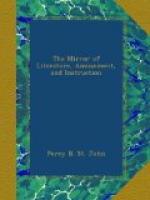(For the Mirror.)
Methought upon a mountain’s brow
Stood Glory, gazing round
him;
And in the silent vale below
Lay Love, where Fancy found
him;
While distant o’er the yellow plain
Glittering Wealth held wide domain.
Glory was robed in light; and trod
A brilliant track before him,
He gazed with ardour, like a god,
And grasp’d at heaven
o’er him;
The meteor’s flash his beaming eye,
The trumpet’s shriek his melody.
But Love was robed in roses sweet,
And zephyrs murmur’d
nigh him,
Flowers were blooming at his feet,
And birds were warbling by
him:
His eyes soft radiance seem’d to
wear,
For tears and smiles were blended there.
Gay Wealth a gorgeous train display’d.
(And Fancy soon espied him,)
Supine, in splendid garb array’d,
With Luxury beside him;
He dwelt beneath a lofty dome,
Which Pride and Pleasure made their home.
Well; seeking Happiness, I sped,
And, as Hope hover’d
o’er me,
I ask’d which way the nymph had
fled,
For four roads met
before me—
Whether she’d climb’d the
height above,
Or bask’d with Wealth, or slept
with Love?
I paus’d—for in the lonely
path,
’Neath gloomy willows
weeping,
Wrapt in his shroud of sullen wrath,
The Suicide was sleeping,
A scathed yew-tree’s wither’d
limb,
To mark the spot, frown’d o’er
him.
I wept—to think my fellow-man,
(To madness often driven,)
Pursue false Glory’s phantoms, then
Lose happiness and heaven:
I wept—for oh! it seem’d
to be
A mournful moral meant for me!
But lo! an aged traveller came,
By Wisdom sent to guide me,
Experience was the pilgrim’s name,
And thus he seem’d to
chide me—
“Fool! Happiness is gone the
road
That leads to Virtue’s calm abode!”
Jesse Hammond.
* * * * *
MY COMMON-PLACE BOOK.
No. XXI.
* * * * *
ORDEALS.
Four kinds of ordeals were chiefly used by our German ancestors:—1. “The Kamp fight,” or combat; during which the spectators were to be silent and quiet, on pain of losing an arm or leg; an executioner with a sharp axe. 2. “The fire ordeal,” in which the accused might clear his innocence by holding red-hot iron in his hands, or by walking blind-fold amidst fiery ploughshares. 3. “The hot-water ordeal,” much of the nature as the last. 4. “The cold-water ordeal:” this need not be explained, since it is looked on as supreme when a witch is in question. The cross ordeal was reserved for the clergy. These, if accused, might prove their innocence by swallowing two consecrated morsels taken from the altar after proper prayers. If these fragments stuck in the priest’s throat he stood ipse facto—condemned; but we have no record of condemnation.




